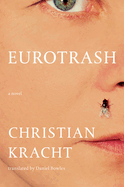
In Eurotrash, the acutely observed, acerbic novel by Christian Kracht (The Dead), translated from the German by Daniel Bowles, a middle-aged man takes his octogenarian mother on a road trip. Kracht's narrator, a writer named Christian, spends much of the novel gazing at the wasteland of his family's past, wondering "how it had even been possible to succeed in extricating [himself] from [his] family's misery and mental illness," and become "a halfway normal human being." He's consumed by the legacy of his grandfather, an officer in the SS who resisted denazification.
Christian's childhood is catnip for Europhiles: a chalet in Gstaad adorned with priceless art, a summer home in St.-Jean-Cap-Ferrat, nights spent at media mogul Axel Springer's house in Kampen on the island of Sylt. However, there's rot at its core. His father, now dead, treated accumulating wealth and therefore power as his sole aim in life. Christian, who sees a connection between money and garbage, observes the world through a finely tuned lens of class.
Christian describes his alcoholic, ostensibly mentally ill mother as "caught in a spider web of resentment, fury, and loneliness," noting her taste for cheap wine, storage units for furs, and closets full of unworn Ferragamo shoes. He visits her every other month in Zurich, where she usually asks for a story. This time, however, Christian veers from the usual visit by ordering a taxi and embarking on a tour of his childhood, after a stop at a disappointing commune. Along the way of this biting family portrait, Christian's mother delightfully complicates his understanding of her mental capacities. --Nina Semczuk, writer, editor, and illustrator

